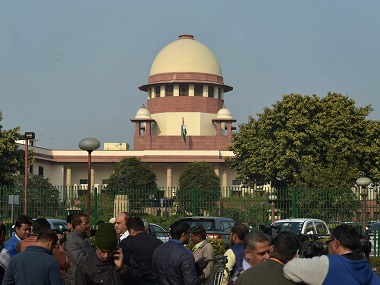The Supreme Court is again abreast with the challenge to the constitutionality of Section 377 of the Indian Penal Code. Before delving into the question of the constitutionality of Section 377, a brief context about the provision is in order. [caption id=“attachment_4686761” align=“alignleft” width=“380”]  A view of Supreme Court of India. PTI[/caption] Section 377 forms a provision of the Indian Penal Code (IPC), which was enacted in 1860. More interestingly, the broad framing of the code with the submission of its final draft occurred in 1837. The code came into operation in 1862. Therefore, the IPC is an old law and contains provisions based on the value system practiced in those times. The IPC is also one of those laws which predate our Constitution. Laws are frequently moralistic and certainly reflect the morality of the age when they were framed. This is why periodic amendments to major legislations are continuously done to keep such laws relevant in the present context. Section 377 is one such moralistic provision framed by our former colonial masters: Which reflects the morality of that age. Interestingly, the IPC was not backed by any democratic legislative process. It was enacted by the governor general in council. It didn’t even have the will of British Parliament behind it. Basically, it just reflects the will and morality of the drafters of the code. The effect of operation of Section 377 is that it criminalises intercourse against “the order of nature”. The order of nature is something which is abstract and can change with changing times. However, due to the presence of this provision, homosexuality is criminalised and such communities are not only deprived of their fundamental rights but also are criminalised for the same. The Indian Supreme Court dealt with this challenge once before in the case of Suresh Kumar Koushal vs. Naz Foundation wherein it chose to reinstate the Constitutionality of the section, which was declared ultra vires by the Delhi High Court. The rationale of the court then was that this is the job of the legislature and the judiciary shouldn’t interfere. Technically, this can be a defence to not at all exercise the power of judicial review, which the apex court does to protect the violation of Fundamental Rights of the people in case a law violates the same. In this case, the apex court was basically avoiding delving into this matter. However, in the case of Justice KS Puttaswamy(Retd) vs Union Of India, the Supreme Court declared that Right to Privacy is a Fundamental Right. Through this case, even though it explicitly didn’t deal with decriminalisation of homosexuality, a changed attitude of the court regarding the subject was manifested. In the case of Navtej Singh Johar v Union of India, the court is on the right track and is looking to correct its past mistake of Naz Foundation. The argument against Section 377 is as basic as State having no business in interfering with the personal lives of the people. It shouldn’t be bothered about it. Any modern State can’t be this paternalistic, more so if it is a democracy which guarantees its citizens fundamental human rights. Hence, decriminalisation of homosexuality shouldn’t even be a matter of debate. The matter with which the court is dealing in this case has two dimensions: Civil rights of the homosexual community and the constitutionality of Section 377. The question of civil rights of homosexuals is very important because it is meaningless to have such a relationship without having the incidental rights under personal law, property law and law of inheritance. Traditionally, criminal law recognised a wrong act as a crime and subsequently criminalised it. A class of people being criminalised is an ancient concept which has been rightly discarded long ago. Therefore, it can certainly be hoped for that the court will legalise homosexuality but recognition of civil rights is something that will have to wait. Former attorney general Mukul Rohatgi referred to homosexuality as something people are born with. And even if that is not the case, it doesn’t make a case for its criminalisation. It looks as if the court has settled on the second question. With the Government of India not having a clear stand, it is almost certain that Section 377 will be read down so as to decriminalise homosexuality. In this regard, it is important to take note of the views expressed by Justice DY Chandrachud. He makes a very pertinent point that Section 377 criminalises a class of people and not an act.
The Supreme Court is again abreast with the challenge to the constitutionality of Section 377 of the Indian Penal Code. Before delving into the question of the constitutionality of Section 377, a brief context about the provision is in order.
Advertisement
End of Article


)

)
)
)
)
)
)
)
)



